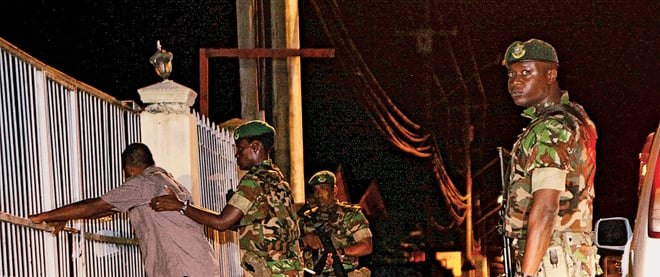Fighting violent crime, Canadian-style, in Trinidad and Tobago
An Edmontonian tries to tackle the islands’ exploding crime rate
Andrea De Silva/Reuters
Share

On an average Friday night in Port of Spain, Trinidad, food-cart vendors line the streets, plying locals with treats like roti and doubles. But for a few weeks this summer, the carts went silent. Trinidad and Tobago’s prime minister declared a national state of emergency on Aug. 21, following a wave of gang violence. The measure, which granted the police additional powers of arrest, included a curfew valid from 9 p.m. to 5 a.m. As a result, workers who would otherwise have lingered outdoors until 11 p.m. or later were rushing home directly from work, says Dianne Williams, who teaches criminology at the University of the West Indies. “Those vendors would have felt it,” she says.
The question, though, is whether the criminals will feel it too. In September, Prime Minister Kamla Persad-Bissessar extended the emergency, with reduced curfew hours, for three months. The measure came at the tail end of a decade’s rise in violence in Trinidad, and a year into Canadian Dwayne Gibbs’s three-year term as the country’s top police official. Gibbs, a former police superintendent in Edmonton, says the curfew has allowed police to get ahead of the criminals, to concentrate on strategic strikes instead of constantly reacting to crises. But others worry the emergency is just punting the problems down the field, delaying an inevitable return to the chaos while restricting the rights of the average citizen.
Part of the problem is that few agree on what exactly is behind the violence in Trinidad and Tobago. Beginning in 1999, homicide rates in the twin-island nation began to soar. That year, 93 people were murdered in the country. By 2008 the annual count had climbed to 550, a nearly sixfold increase in just 10 years. That rate, in a country with a population of just over 1.2 million people, made Trinidad one of the most murder-prone countries on Earth. And while the number of killings dipped slightly in recent years, in the eastern slums of Port of Spain violent gangs continue to operate with near impunity.
Many see the violence in Trinidad as part of a larger regional problem. As a tourist hub just kilometres from the South American coast, Trinidad serves as a transit point for drugs coming north from Venezuela and out to Europe and North America. With no single cartel on the island to control the flow, small gangs battle constantly for turf and market share. “It’s an unstable drug market, basically,” says Nathan Pino, a sociologist at Texas State University, San Marcos. “They keep killing each other for supplies and routes and that sort of thing.”
But others aren’t convinced drug trafficking is the root cause. “We conducted a substantial amount of research on that issue and we found that was not the case,” says Charles Katz, who teaches at the Center for Violence Prevention and Community Safety at Arizona State University. Katz instead pinpoints three interrelated causes for the violence: a rise in gang activity related to a state unemployment program (basically, the more territory a gang controls, the more money for make-work projects it can siphon off); an increase in gun use; and a lack of official capacity to deal with the problem.
It’s on that last point that Dwayne Gibbs comes in. A 30-year veteran of the Edmonton police, Gibbs was hired last year to help modernize Trinidad and Tobago’s oft-maligned constabulary. A 2007 U.S. diplomatic cable, released by WikiLeaks, reported that it was widely recognized, even in official circles, that the force needed new training and leadership. After an international search for a new police commissioner, parliament rejected the first choice. Gibbs was the second.
The Edmontonian’s appointment was not without controversy. Opposition leaders questioned how an officer trained in a city with a homicide rate about one-twentieth of Trinidad’s could solve the island’s problems. Others attacked Gibbs’s credentials. (He has a Ph.D. from a university once listed in a U.S. diploma-mill probe.) Many residents, meanwhile, viewed the idea of bringing in an outsider as a slap in the face. To add to the insult, the government hired Winnipegger Jack Ewatski to serve as one of Gibbs’s deputies.
Gibbs hopes to be judged by the work he does. “Things are getting better,” he says. “Even before the state of emergency, over the year we’ve been here we’ve seen a steady decline in crime [and] homicides.” Gibbs hopes the police can use the breathing room the curfew is giving them to make meaningful changes. If they can, Gibbs might be able to hand over a revitalized department coping with a manageable murder rate when his term ends in 2013.
As for Williams, she thinks the vast majority of people, cart vendors aside, are actually pleased with the curfew. But if it ends, as it inevitably must, and everything returns to the way it was, those opinions will likely change.